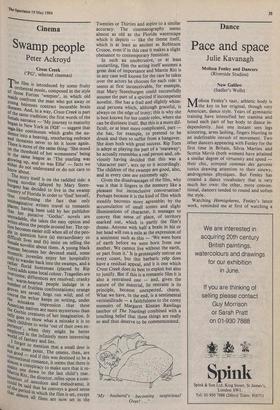Cinema
Swamp people
Peter Ackroyd
Cross Creek ('PG', selected cinemas)
The film is introduced by some fruity orchestral music, composed in the style of those Forties 'weepies', in which old maids confront the man who got away or young heiresses contract incurable brain of
diseas part
. And, in a way, Cross Creek is pa the se s ame tradition; the first words of the
female narrator — 'My journey to maturity
began in New York in 1928' — suggest that saga-like continuum which grabs the au- dience into a heaving, smothering embrace and threatens never to let it loose again. There is more of the same thing: 'She stood On the threshold of her womanness' being in the same league as 'The yearling was ar°‘ving op, and so was Ellie' — facts we either do not understand or do not care to know about. The story itself is on the raddled side: a young novelist (played by Mary Steen- o Urgen) has decided to live in the swamp pcountry of Florida in order to 'find' herself, th us _ confirming the fact that only hunimaginative writers travel to romantic ees; having been told by her publisher t her Putative 'Gothic' novels are unreadable, she takes the easy option and Writes about the people around her. The op- tion becomes easier still when all of the peo- ple in question have (a) extraordinary or a,Ifficult lives and (b) insist on telling the Teinale novelist about them. A young black woman becomes her devoted maid, some eccentric juveniles enjoy her hospitality only to wander back into the swamps, and a Torn) florid huntsman (played by Rip adds some local colour. Tragedies are overcome; differences are resolved; cranky but warm-hearted people indulge in a number of fruitless confrontations; orange groves are saved; hogs run wild; and of tcourse the writer keeps on writing, under An! mistaken impression that these erican natives are more mysterious than Gothic creatures of her imagination. It teach goes to show what a mistake it is to each children to write 'out of their own ex- tPerience,
when they might be better
wo rld nP'oYed in the infinitely more interesting of fantasy and lies. shotforgot to mention that a small deer is at not goo some Point. The omens, then, are co°°0 — and if this was destined to be a nventional romance, it seems that there is riintt r.iosSt a conspiracy to make sure that it re- um4,1.a.t., Ritt, t one down director
he to the last child's tear. , relies upon a com-
e 'on of anecdote and melodrama; it
co 13 •
of „ be said that he conveys a good sense that Period in which the film is set, except at almost all films are now set in the
Twenties or Thirties and aspire to a similar accuracy. The cinematography seems almost as old as the Florida waterscape which it depicts — like the theme itself, which is at least as ancient as Robinson Crusoe, even if in this case it makes a slight obeisance to contemporary feminism. In such an unobtrusive, or at least unstartling, film the acting itself assumes a great deal of importance and Martin Ritt is in any case well known for the care he takes over the actors he chooses for each role: it seems at first inconceivable, for example, that Mary Steenburgen could successfully assume the part of a spirited if incompetent novelist. She has a frail and slightly whim- sical persona which, although graceful, is always on the edge of irony; this is why she is best known for her comic roles, where she can be dizziness itself. But this is a more dif- ficult, or at least more complicated, part she has, for example, to pretend to be drunk and then to suffer from a hangover. She does both with great success. Rip Torn is adept at playing the part of a 'tearaway'; he actually resembles a real person and, ob- viously having decided that this was a 'character part', acts up to it accordingly. The children of the swamps are good, also, and in every case are extremely ugly.
Given the disadvantages of the film, why was it that it lingers in the memory like a pleasant but inconclusive conversation? Perhaps because it is the kind of film which steadily becomes more agreeable; by the accumulation of small scenes and slight illuminations of character, it manages to convey that sense of place, of territory marked out, which is partly the film's theme. Anyone with half a brain in his or her head will run a mile at the expression of a sentiment such as this — 'We were born of earth before we were born from our mother. We cannot live without the earth, or part from it.' It is grotesquely untrue on every count, but this barbaric yelp does have a residual appeal, and it is one which Cross Creek does its best to exploit but also to justify. But if this is a romantic film it is also a restrained one — and, given the nature of the material, its restraint is its principle, because unexpected, charm. What we have, in the end, is a sentimental verisimilitude — a faithfulness to the corny memoirs of Margaret Kinnan Rawlings (author of The Yearling) combined with a touching belief that these things are really so and thus deserve to be commemorated.
'My husband's becoming suspicious! Over! . • •'














































 Previous page
Previous page